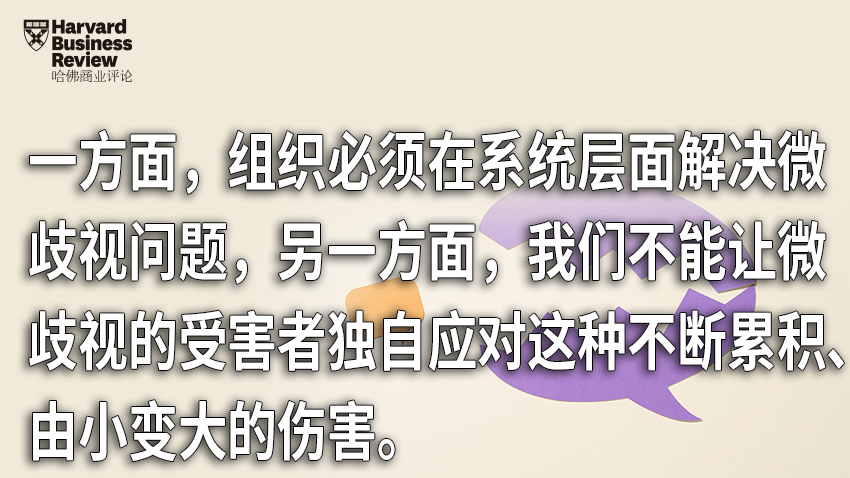How to Intervene When You Witness a Microaggression

微歧视往往是一些无意间排挤或贬低受害者的言行,这种看似细微、稀松平常的行为已经成为管理研究与实践领域的热门话题。虽然在日常生活和学术研究中,人们对这一概念的认识日渐提高(仅在过去两年中,谷歌中“微歧视”一词的搜索量就翻了一番),还举办了非常多旨在引起大众注意的DEI(多元化、公平性与包容性)研讨会,但微歧视问题在少数群体员工中依然普遍存在,并且会在无形中成为许多DEI工作的阻碍。
Microaggressions — those brief, commonplace behaviors or comments that often unintentionally exclude or demean the target — have become a frequently discussed topic in management scholarship and practice. But despite the growing understanding of the concept of microaggression in general (Google searches of the term microaggression have doubled in the past two years alone) and in academic research, in addition to the countless number of practical DEI workshops dedicated to raising awareness, they still remain a common experience for employees from non-majority groups and can be an invisible barrier holding back many DEI efforts.
职场中,针对女性、少数族裔和LGBTQ群体的微歧视普遍存在。这些行为往往以玩笑、在会议中不给发言机会或酸言酸语诋毁受害者等形式出现。或许你曾见过这种情形:某位女士提出了一个想法,但随后这个主意却被记作了某位男同事的功劳。这种事例在工作场所比比皆是,而且给我们想要留住的人才构成的伤害会不断累积。经常遭受微歧视的人更容易感觉自己遭到了排挤,产生疏离感,并最终离开自己的团队和组织。
Women, ethnic- and racial-minority, and LGBTQ people commonly experience microaggressions in the workplace. These behaviors often surface in the form of jokes, exclusion of some voices in meetings, or subtle remarks that denigrate the recipient. Maybe you saw a woman state an idea only to have it be attributed to a male colleague later. Perhaps the one Black woman at the office is frequently asked by others if they can touch her hair. Examples like these abound in the workplace, and they can have accumulative damaging effects on those we want to retain. Those who experience frequent microaggressions are more likely to feel excluded, to disengage, and ultimately leave their teams and organizations.
笔者二人过去都曾探讨过偏见和排挤问题对STEM(科学、技术、工程和数学)领域实现性别多元化的负面影响(在该领域,女性高管占比依然太低)。在最近一项研究中,我们对STEM领域女性高管遭遇的微歧视问题进行了探究。在此过程中,我们对各类组织或领域中“友军”(在对抗微歧视方面)所能发挥的重要作用有了一些有趣的发现。
Both of us have previously explored the role of bias and exclusion as stalling mechanisms in progress toward greater gender diversity in STEM careers, an area where women are still very much underrepresented in senior leadership positions. In our recent research, we explored the experience of microaggressions for women leaders in STEM. In doing so, we uncovered some fascinating findings about the important role allies can play in any organization or field.
职场中的微歧视都有哪些表现形式
What microaggressions look like at work
我们发现,无论身份、专长,在STEM领域,女性最常碰到的微歧视包括如下三种:
We found that the most common types of microaggressions women in STEM experience surface in three ways that you might recognize no matter your identity or what field you work in:
1.否定受害者的能力。此类微歧视表现为质疑、贬低女性技术能力的言行,例如将女员工的工作重新分配给其男同事;要求女员工的男同事为其他同事或客户答疑解惑(即便该女员工是相关领域专家或项目负责人);在绩效评估期间公开质疑某人的技术能力。
Invalidation of competence. This type of microaggression emerges as comments and behaviors that question or downplay a woman’s technical skills. Examples included having one’s work reassigned to a male colleague; having both male and female colleagues or clients asking to speak to a woman’s male colleague even though the woman was the subject matter expert or project lead; and openly having one’s technical accomplishments questioned during a performance review.
2.对受害者视而不见。此类微歧视表现为打断女性发言以及在会议或见面会上完全无视其存在,爱答不理。
nvalidation of physical presence. This type of microaggression emerges as interrupting behaviors during which individuals speak over a woman while she is speaking, as well as completely disregarding her physical presence by not acknowledging her during meetings or meet-and-greets.
3.用“煤气灯行为”及言辞淡化或否认女性遭受的性别歧视。此类微歧视表现为,同事告诉女性说“你所遭遇的情形并非性别歧视”。她可能会给出其他解释,比如“他没有性别歧视、他和每个人都是这样”或者“你不觉得自己在这件事上有些太过敏感了吗?我压根都没注意到”。
Gaslighting behaviors and comments that diminish or deny women’s experience of gender bias. This type of microaggression takes the form of colleagues telling the woman that what she described was not gender bias — for example, by offering alternative explanations (“He’s not sexist; he’s like that with everyone,” or “Don’t you think you’re being overly sensitive about this? I didn’t even notice”).
频繁遭遇此类看似无害的“打击”会给当事女性造成一系列的负面影响,包括负面情绪反应(如沮丧、悲伤)、认知过载(如感到不知所措)和过度补偿行为(如感到需要不断“证明”自己或自己确因相关遭遇而受到了伤害)。此外,随着时间推移,反复接触此类行为会使许多女性在情感上感到疲惫、沮丧。许多受访人表示,为弄清这些敌视行为背后的意图和意义,自己耗费了相当多的认知能量,许多人对是否要与侵害者进行对抗感到十分纠结。
These seemingly harmless, frequent encounters were associated with a range of negative effects for the women who experienced them, including negative emotional responses (e.g., frustration, sadness), cognitive overload (e.g., feeling overwhelmed), and overcompensating behaviors (e.g., feeling the need to constantly “prove” oneself or one’s experience). Further, repeated exposure to such behaviors over time left many women emotionally exhausted and dejected. Most shared that they spent a considerable amount of cognitive energy deciphering the intent and meaning behind the aggressions, and many grappled with whether to confront the aggressor.
日积月累,这些负面影响最终会导致许多女性对自己的技术能力和工作能力产生怀疑。事实上,我们发现,反复接触微歧视最终可能会导致合格、称职的女性员工不愿继续留在STEM领域或从事该领域的工作。
The combination of these negative effects ultimately made many women doubt their technical competence and ability. In fact, we found that repeated exposure to microaggressions may eventually discourage qualified and competent women from remaining in or pursuing careers in STEM.
微歧视何以如此盛行
Why microaggressions are so prevalent
在大家对微歧视的认识日益提高的背景之下,这一问题为何仍然无法得到根除呢?首先,大多数微歧视都发生在细微之处,因而很难发现。其次,大多数DEI培训都是一次性活动,虽是迈出了重要的第一步,但却缺乏发现、解决微歧视问题所需的持续性,在实践技能培养方面也存在不足。
If people are increasingly aware of microaggressions, why are they still such a problem? First, most microaggressions are subtle and can thus be difficult to recognize. Second, most DEI training tends to be offered as one-off sessions, which are an important first step but lack the continuity and practical skill building necessary to both recognize and address microaggressions.
因此,微歧视日渐盛行,俨然已经融入日常工作、企业文化之中。此外,在现实生活中,常常要由受害者来承担发现微歧视行为、教育侵害者的责任,这样会给受害者造成极大的情感和心理创伤。
Consequently, microaggressions can become so commonplace that they’re often ingrained in everyday work interactions and embedded in company cultures. Further, it’s often left to the target to spotlight the microaggression and educate the offender, which can take an immense emotional and psychological toll.
正面对抗侵害者可能也会给受害者的职业发展带来负面影响,因为那些选择直面自己所遭受的微歧视行为的人员常会被冠上“麻烦制造者”“小家子气”“过于敏感”或“利用自己的少数身份牟利”等标签。
Confronting the aggressor can also have negative professional consequences, as those who choose to address the microaggressions they experience can be labeled as troublemakers, poor sports, too sensitive, or playing the “minority card.”
事实上,研究表明,正面对抗可能要付出很高的代价,如果进行反抗者是受害者本人的话尤其如此。考虑到个人发展和晋升的机会在很大程度上要靠个人的人脉和关系,许多受害者选择保持沉默也就不足为奇了。
Indeed, research shows that the cost of confrontation can be steep, especially if the confronting person is the target. And given that opportunities for development and promotion rely heavily on personal connections and relationships, it’s no wonder why many targets choose to remain silent.
如果任由微歧视行为扩散开来,就会形成互相排挤甚至互相敌视的工作环境,还会伤害受害者和友好同事之间的关系。因此,在目睹微歧视行为时,我们能否出手相助就显得至关重要。
If microaggressions proliferate, they can contribute to exclusionary and even hostile work environments, as well as weakened relationships among targets and well-intentioned individuals. It’s critical, therefore, that those who witness microaggressions intervene.
身为“友军”,如何出手相助
How allies can intervene
作为旁观者,未能出手相助的原因通常有两个,一是因为没有发现微歧视行为,二是虽然发现了微歧视行为,但没有意识到问题的严重性。此外,在解释自己为何不像受害者一样直接指出侵害者行为不当时,微歧视行为的目击者常会给出相似的理由,而且对于目击者而言,与侵害者当场翻脸有时也不一定安全(比如说,目击者是侵害者的下属,害怕直接翻脸可能会给自己的职业发展造成不利影响)。
Bystanders often fail to intervene because they either don’t recognize the microaggression, or if they do, they don’t see it as problematic. Additionally, people who witness microaggressions often cite similar reasons for not confronting aggressors as targets do, and it may not always be safe for witnesses to publicly confront the aggressor in the moment (if, for example, the witness is junior to the microaggressor and fears direct confrontation might come with professional consequences).
我们发现,在当事女性遭遇微歧视时,那些伸出援手的“友军”(男女同事)在解决微歧视问题、减轻当事女性所受负面影响方面具有重要作用。相较于受害者,“友军”往往在组织内部级别更高、资历更老、经验更丰富;不过我们也看到过许多同级同事出手干预的例子,这说明,每个人都可以扮演“友军”的角色。当你在工作中发现微歧视行为时,无论身处何种级别,都可以通过如下三种方式扮演“友军”角色。
We found that unprompted and supportive allies — both male and female colleagues — who intervened and interrupted the negative experiences played an important role in addressing microaggressions and mitigating their effects on the targeted women. These colleagues often had more seniority, tenure, and experience within the organization than the targets; however, there were also examples of peers intervening, suggesting that anyone can practice allyship. Here are three ways you can act as an ally when you witness microaggressions at work, no matter your level of seniority:
弄清楚应该注意哪些行为。要想尽可能发挥好“友军”作用,我们首先要弄清楚微歧视的不同表现形式,还需要注意,大多数微歧视出现在细微之处,乍看起来只是一些不经意的言行,因此可能会被大多数人(包括我们)所忽视。也就是说,我们要能发现微歧视的存在,还要能理解其影响受害者的特定方式。尤其重要的是,我们要听受害者讲述自己遭遇微歧视的故事,从而深入了解那些看似普遍、平常甚至不为人所注意的行为是怎样对特定人群造成伤害的。
Know what to look for. To best help as an ally, first, educate yourself about different forms of microaggressions, and note that most will emerge as subtle behaviors and comments that are often unintended, and thus may go unnoticed by most people — including you. This means understanding and being able to identify the specific ways microaggressions manifest and impact targets. It’s particularly important to listen to targets who share examples of microaggressions, as they can provide insight into how seemingly common, everyday behaviors that you may not even recognize can denigrate certain groups.
路见不平一声吼。只要时机恰当,在发现微歧视时可以当即出手相助。正如我们的研究表明的那样,干预有时只是举手之劳,比如在开会上对女同事的想法给予肯定(“玛丽亚,谢谢你给出的建议,我们不妨就此展开讨论”)、打断插话者(“你等会儿再说,普里亚还没讲完呢”),或者在其他人试图诬陷女同事能力不足时,肯定她的能力和成就(“我敢肯定,就是瑞秋写的那条代码。你应该问问她”)。请注意,不要代替受害者发声,也不要假设你懂得他们的感受(“你让她很不好受”),而是要代表你自己发声(“那句话让我感觉很不舒服”)。
Speak up. When and where appropriate, address microaggressions when you see them. As demonstrated in our study, intervening behaviors can be as simple as giving a woman credit for her idea during a meeting (“Thank you, Maria, for that suggestion. Let’s explore that more”), interrupting the interrupter (“Actually, Priya wasn’t done speaking”), or highlighting a woman’s competence and accomplishments if others try to incorrectly deny her abilities (“I’m pretty sure it was Rachel who wrote that code. You should ask her about it”). It’s important not to speak on behalf of the target or assume you know how they feel (“You made her uncomfortable”), but to speak on your own behalf (“That comment made me uncomfortable”).
例如,一位参与研究的受访者回忆道,尽管她带头做了几个项目,而且是唯一知道如何使用这些项目所需的编程语言的人,但是一帮经理在对她进行业绩评估时还是给出了不公评价,认为她“全靠主管照顾”、自己成绩寥寥,这时,她的主管公开表达了反对意见。由于主管有过与她共事的经历,完全有资格对她的技术能力做出评价,在获得主管撑腰之后,她便完全打消了对自己技术能力不足的疑虑。
For example, one study participant recounted a situation in which her male director openly challenged the results of her biased performance review among a group of managers who had concluded that she was too far “beneath the director’s wing” and had not accomplished much on her own — even though she had spearheaded several projects and was the only one who knew how to use the programming language necessary for them. Importantly, because the director had worked with her and could speak to her technical competence, his intervention dispelled any doubts she had about her technical abilities.
该出手时就出手。要想帮助女性对抗她们遭受的“心理操控”(gaslighting),我们要承认她们在工作场所确实遇到了性别偏见。比如我们可以简单地向她们确认,她们遭受的确实属于偏见或不恰当行为。
Reach out. To help women combat the frequent gaslighting they counter, validate their experiences navigating gender bias in the workplace. This can take the form of simply confirming to a colleague that what she experienced was indeed biased or inappropriate behavior.
例如,有受访者与我们分享了这样一段故事,在一次会议中,她的发言一再被打断,有位男同事注意到了这种情况,并告诉她下次再有这种情况自己会站出来帮她说话,这种做法让她感觉自己得到了肯定和重视。对于这位女性而言,这种干预大有裨益,一是因为这是其他同事的自发行为,二是因为这种支持确认了她因性别歧视所受困扰的真实性。
For example, one study participant shared the validation and appreciation she felt when one of her male colleagues noticed the interrupting behavior she had experienced repeatedly in a meeting and said he was going to address it the next time it happened. This intervention was particularly impactful for the woman because it had emerged unprompted by her, confirming her reality and struggles as a woman dealing with gender bias.

这种特殊类型的“仗义出手”可以私下进行,可能也比较适合不方便公开曝光或对抗侵害者的情况。我们发现,在缓解微歧视的负面影响方面,私下为女性提供支持也可以发挥极大作用,比如可以防止她们内化对自身能力的错误质疑,更安心地面对自己STEM专业人员的身份。他人自发的肯定也能帮助女性外化威胁,将问题归咎于侵害者而不是怪罪自己,同时还能帮助她们确认自己拥有留在STEM领域所需的技术能力,从而获得更多归属感。
This particular type of ally intervention can be done privately and may be appropriate in situations where public exposure or confrontation of the aggressor is not feasible. We found that privately supporting women can still have a powerful ameliorating influence in buffering the negative effects of microaggressions, enabling them to feel more secure and stable in their identities as STEM professionals — by, for example, preventing them from internalizing erroneous assumptions about their competence. Receiving unprompted validation from allies also helped women externalize the threat by blaming the aggressor instead of themselves while confirming their own technical abilities and belonging in STEM.
一方面,组织必须在系统层面解决微歧视问题,另一方面,我们不能让微歧视的受害者独自应对这种不断累积、由小变大的伤害,这一点至关重要。就现实而言,有些时候,仗义出手并不容易做到,在缺乏心理安全感、害怕报复的组织中尤其如此,即便是“友军”可能也会瞻前顾后。不过我们可以尝试让这种支持行为正常化,帮助打造一个没有排他性行为、更具包容性的工作场所。
While organizations must address microaggressions at a systemic level, it’s critical that targets of microaggressions not be left alone to deal with the accumulating effects of these slights. Realistically, it isn’t always easy to intervene, particularly if an organization lacks psychological safety and there is fear of retaliation — even for allies. However, you can normalize allyship behaviors, helping to shape a more inclusive workplace devoid of exclusionary behaviors.
关键词:职场
珍妮弗·金(Jennifer Kim)艾莉森·梅斯特(Alyson Meister)| 文
珍妮弗·金是塔夫茨大学医学院(Tufts University School of Medicine)药物开发研究中心助理教授,主要研究健康和工作场所公平问题,多元化、公平性与包容性会对个人、集体和组织的结果产生何种影响也在其研究之列。
艾莉森·梅斯特是瑞士洛桑国际管理发展学院(IMD)领导力与组织行为学教授,她的研究、教学和咨询工作主要围绕卓越领导力培养与团队建设、工作场所幸福感与包容性组织建设等领域展开,研究成果得到诸多期刊刊载,2021年,她获得Thinkers50 Radar思想领袖称号。
刘隽 | 编辑




